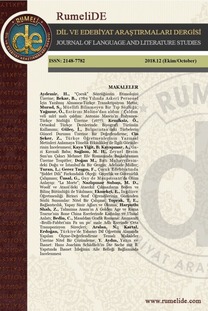Doğum Günü Partisi: Bir pinter modeli absürt tiyatro
Tiyatro oyunlarında makul bileşenleri kullanan edebiyat Nobel ödüllü Harold Pinter’in dili, şaşırtıcı veya kafa karıştırıcı olmayıp, asıl İngilizce kabul edileceği kadar saftır. Pinter’in ünlü oyunlardan biri olan ikinci uzun oyunu Doğum Günü Partisi, Absurd Tiyatro başlığı altında kategorize edilir. Bu başyapıt, ana karakterler arasında geçen ikilemi diyalog halinde gösterirken, Meg, Petey ve Stanley, pratik bileşenlerin altında, insan kimliğinin mantıksızlığı sergilemektedir. Üç bölümden oluşan öykü, 1950’lerde yalnızlık teması altında, yatılı evde hayatını devam edemeyeceğini fark eden ve küllerinden doğan bir adamın hikayesini anlatır. Doğum Günü Partisi, bir değişimin bütün mantıklı bileşenleri ile donatılmıştır; hakiki duygulara bürünmüş samimi karakterler ve sıradan tehditler, gerçek dünya ve saptırmayı harmanlayarak bir arada tutarlar. İkinci dünya savaşı sonrası, gerçek dünyada bireyleri tehdit eden fiziksel ve zihinsel zorluklar neticesinde, onları tedirgin eden konular gösterilerek tanımlanırken, sosyal statü saçmalılığının karakter üzerindeki etkileri gösterilir. Oyunun tuhaf görünen karakterleri dış dünyaya maruz kalmaktan kaçınırken, toplumdaki yabancı korkusunu da gizleyemezler. Asıl karakteri tamamen deşifre etmeden heyecanı bozmayan oyun, bir Karakter Dramı örneği olarak bilinir.
Anahtar Kelimeler:
Pinter modeli oyun, absürt tiyatro, Doğum Günü Partisi, Kaos, Körebe Oyunu
The Pinteresque Absurdum in The Birthday Party
Utilizing reasonable components in his plays, Pinter’s dialect is not confusing or surprising, but genuine-because of its unadulterated English dialect. The Birthday Party is Pinter’s second full-length play and one of the most celebrated plays categorized under the title of the Theater of Absurd. This masterpiece follows the dilemma in the dialogue between the main characters. Meg, Petey, and Stanley demonstrate the preposterousness with the embodiment of human identity under practical components, such as goodness. The play’s central theme is loneliness and explains the story of the reborn man who realizes that his life cannot continue in the boarding house. The Birthday Party is outfitted with all the sensible components of an impeccable diversion; genuine characters with genuine sentiments, unpretentious dangers, ghastliness fulfilled with an inevitable setting that accentuates to blend of the real world and drivel. In The Birthday Party, the solidarity in the real world is clearly described, and the absurdity of social status by the real characters is uncovered. The threats of exploiting the hearts and minds of postwar individuals have shocked them both physically and mentally. Individuals did not want to be exposed to the outside world while they were afraid of strangers in society. To be amusing, the play coasts the title of Men’s Comedy of Menace while battling with the genuine risk of exploring the focal character.
Keywords:
Pinteresque, the theatre of absurd, The Birthday Party, Chaos, Blind Man’s Buff,
___
- Beaufort, J. (1964). “Pinter’s Words Cut Through,” in The Christian Science Monitor, June 24, pp. 6.
- Bogumil, L. M. (Summer, 1992). “Gameplaying: Conventional and Narrative Games in Pinter’s The Birthday Party,” in Massachusetts Studies in English, Vol. 11, Nos. 1 & 2, p. 72-83.
- Campbell, J. (25March, 1994). “The Slow Unbaffling of the Pinterwatchers.” Times Literary Supplement, no. 4747.
- Disch, T. M. (21 May 1988). Review of The Birthday Party. Nation.
- Esslin, M. (1963). “The Theatre of the Absurd.” Theatre in the Twentieth Century, Ed. Robert W. Corrigan. New York: Grove Press, pp. 223.
- Hewes. H. (26 August 1961). “The Frisco Kids,” in Saturday Review, Vol. 44, no. 34.
- Kaufman, W. M. (1973). “Actions That a Man Might Play: Pinter’s The Birthday Party,” in Modern Drama, Vol. 16, No. 2, pp. 167-78.
- Knowles, R. (2001). “Pinter and the Twentieth Century Drama,” The Cambridge Companion to Harold Pinter, Ed. Peter Raby. Cambridge: Cambridge University Press, pp. 74
- Lesser, O. S. (Winter, 1972). “Reflections on Pinter’s The Birthday Party,” in Contemporary Literature, Vol. 13, No. 1, pp. 34-43.
- Matosoğlu, A. (2012). “The Theatre of the Absurd: Beckett and Pinter.” Tiyatro Eleştirmenliği Ve Dramaturji Bölümü Dergisi , vol. 21, no. 2, pp. 79–96.
- Pinter, H. (1991). The Birthday Party. London: Faber, Print.
- Pountney, R. (2009). The Birthday Party. Retrieved July 30, 2019, from https://www.encyclopedia.com/arts/educational-magazines/birthday-party
- Thomson, P. (Winter, 1978). “Harold Pinter: A Retrospect,” Critical Quarterly, Manchester University Press, Vol. 20, No. 4.
- ISSN: 2148-7782
- Yayın Aralığı: Yılda 6 Sayı
- Başlangıç: 2014
- Yayıncı: Yakup YILMAZ
Sayıdaki Diğer Makaleler
Modern Ophelialar: Karşılaştırmalı edebiyat bilimi çerçevesinde bir uygulama
“El” Organ adıyla kurulmuş Türk ve Gürcü deyimlerinde eşdeğerlikler
“Batı Kültüründe Türk Atasözleri” kitabı üzerine
Kurmaca metinlerde tarihi bir şahsiyet olarak Timur
Kültürümüzde manzum yağmur duaları
Mikheil Cavakhişvili’nin “Suçsuz Abdullah” eserinin Türkçeye Tercümesinde kelime ve ifadeler
Mehmet Asaf’ın [Borsacı] Beyimin Edebiyata Merakı adlı tiyatro eseri ve incelemesi
İki teori, iki pratik ya da olağanüstü olağana karşı
Tezyînî kitap sanatları konulu Türkçe bibliyografyalar üzerine bir değerlendirme
